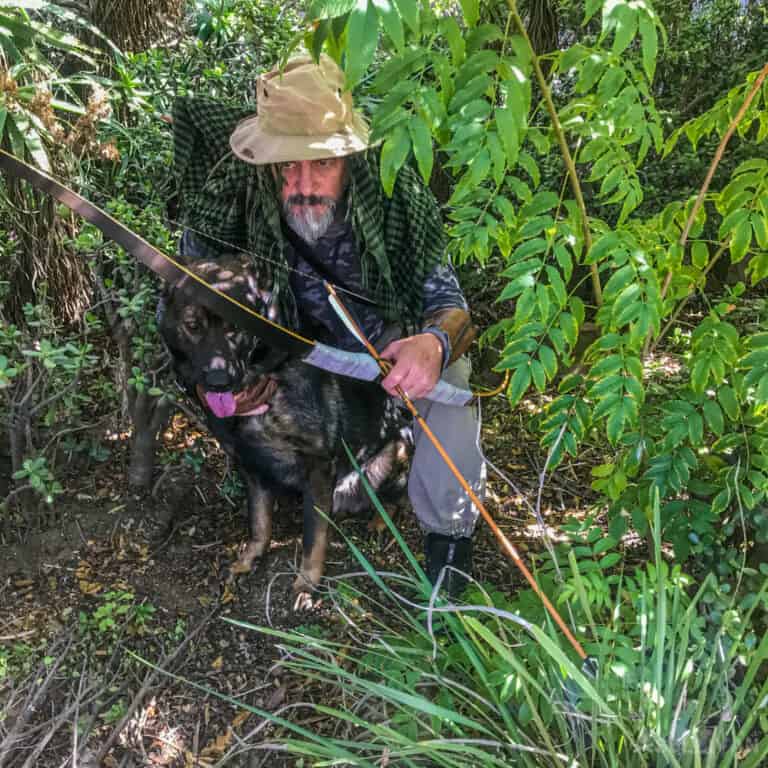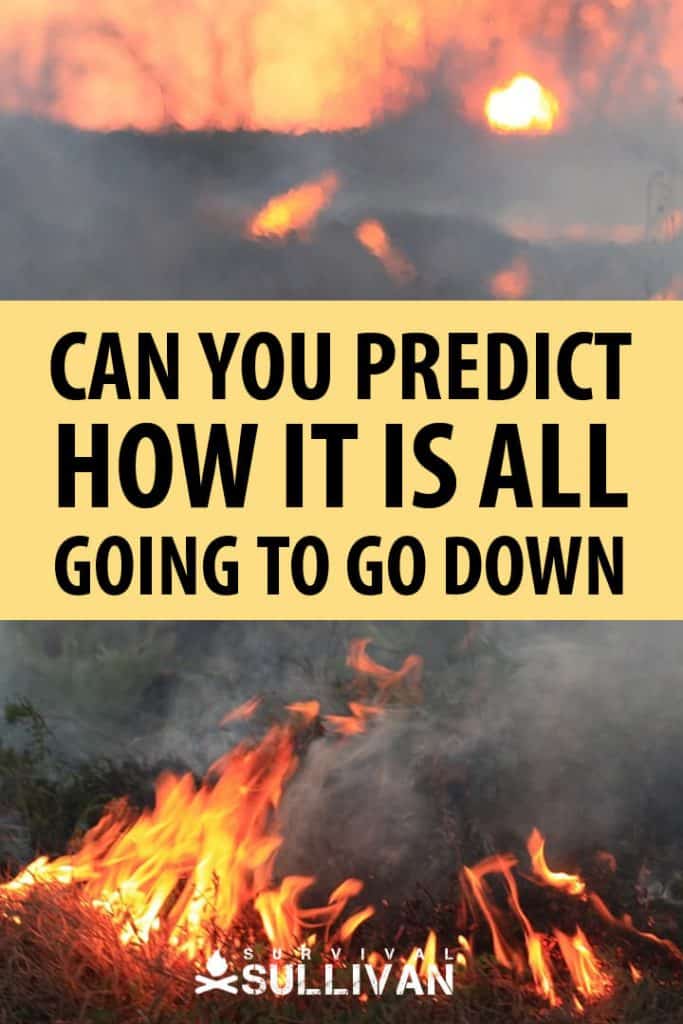Preppers perhaps more than anyone spend a disproportionate amount of time analyzing, wondering and even, perhaps, darkly fantasizing about the Big One, the event that will set society and perhaps the entire country, even the world, up on its end.

It is in our nature to try and discern what the future holds, what threats might be out there waiting in the dark of the unknown.
There is nothing wrong with it, so long as your pondering is not done idly. Combined with the drive to prepare, this is the core principal of prepping: be ready, just in case.
But the intelligent prepper will take this line of inquiry one step further: what would I best spend my time and energy preparing for?
A prepper cleverer (or just more concerned) will go yet further and ask: how can you prepare for anything if you don’t know what it is? It is a good question, so long as one does not follow it too far into paranoia and nihilism.
And we should strive to answer it. We have only so much time, energy, and financial resources to prepare for any given threat, and though many preps are universal in their benefit, not all crises can be mitigated or avoided with a one-size-fits-all approach.
In today’s article, we’ll explore the more esoteric side of prepping and discuss prepping philosophies for predicting and preparing for, or at least trying to, various threats and disasters.
Table of Contents
The Sliding Scale of Threat Awareness
Preppers are an ideologically diverse lot. For every real-life, no-kidding doomsday survivor waiting on a rogue comet or titanically destructive reversal of Earth’s magnetic poles from the safety of his definitely up-to-code DIY underground bunker complex, you’ll have a weekend warrior prepper who is dead serious about self-reliance and self-rescue in case the next big flood happens.
There is no “right” or “wrong” way to prep. Sure, there exists a more or less codified set of principles that should guide your decision-making process based on logical predictions and assumptions, but what makes sense for me or you could be unthinkable for one of our associates down the road, or even actively detrimental to their chances of survival. Think about that.
What is most interesting to me is how varied the “lenses” are through which any given prepper views their world.
Some have been energized by the potential of a Big One, a black swan event, the paradigm shift that sets history going in an entirely new era and calendar: Before the Big One and After the Big One.
These are the classic Doomsday Preppers. They see preparing for mundane and everyday mishaps, emergencies, and lesser crises as secondary to the Mission.
And, they reason, if they are ready, really ready for the apocalypse then all manner of minor curveballs and mere bedlam will fall under that umbrella.
Then you have your Times-Are-A-Changing preppers. The ones who sense a shift in the order of things, a detection in the simmering now of sentiment and hostility.
They fear the pot may boil over ‘fore the heat is turned off, and this instinctive instinct of defense and preparation, almost vestigial in these times, has set them scurrying like an ant making ready for winter.
To them, the event will take the form of a man-made or at least man-ushered catastrophe, a “flipping of the table” on society. They rightly stay concerned over where they may land amid the rubble and wreckage of even a “soft” revolution.
And then you have the Ruthless Pragmatists, your intrepid author counted among them, preppers who are concerned predominately with the most likely threats based on activity and environment, no matter how plain and boring they are.
The pragmatists will spare not a thought for meteors, solar flares, and other esoteric and rare phenomena when car wrecks, hurricanes, and societal unrest are far more likely to impact us in our lifetimes.
Here’s the thing, all of these approaches are valid, at least valid enough in the mind of an individual prepper to get someone off the couch and out of their chair and doing something.
But the nagging question that remains unanswered is can one ever truly predict what will happen? Should we even try? And what are the consequences for failing to predict or prepare for the threat we wind up facing on the fateful day the excrement hits the oscillator?
Application is What Counts, Not Theory
While we cannot truly predict what will occur, we can make good, educated guesses based on all available data.
And before we even get to all that, there is a little thought exercise that will help you determine what kind of prepper you are, and is actually pretty educational when it comes to sifting what is important from what is ephemeral.
Consider the classic exercise of the glass of water; half full, or half empty, and what kind of person you are is determined with broad strokes with how you identify (read, perceive) the glass of water- fuller or emptier?
Of course, full or empty is only the simplest of possible interpretations of personality types. An analytic would ask what the precise internal volume of the vessel is before making a determination.
A philanthropist would ask who lacks access to clean water and seek to give it to them. A thief would care only for how they might best abscond with the water and glass. A capitalist would concern himself with the worth of the water in various markets in various places.
An absurdist would say there is no glass and no water, for that matter. You can go on and on and argue about any and all characteristics until you are blue in the face.
But a few people, a small minority, will ask only this most essential of questions: will it quench my thirst?
That is the crux of practical application compared to greater theories. Is the thing an asset, a liability, or a hazard? The water is an asset, in the glass. That same water in the rushing tide of a flood is an immense hazard.
Since the glass of water is an asset, how much of one? How much longer will it keep me alive? What else can it do for me? This is a broad simplification but you get my drift.
No matter what sort of prepper you are, and no matter what threat has bent you to your work, you must endeavor to apply, not just plan, not just know. Only application will form a hedge around you when disaster strikes.
How Do You Prepare for the One-in-a-Million?
In short, you don’t. How can one prepare for any one-in-a-million chance? Such occurrences are so rare across most time scales that they can be said to rarely happen at all.
The classic zombie outbreak, machine takeover, and cosmic holocaust scenarios fit squarely into this category (even if they are more properly one-in-a-billion chances or more).
Am I saying that any of the above won’t happen? No. I am saying that they almost assuredly will not happen, and will take my chances accordingly.
If I am bent to the labor of trying, somewhat vainly I say, to survive a truly, literally apocalyptic event, I am likely letting myself go in to the weeds and grow disoriented, blind to threats no less deadly on a personal level that are right in front of me.
Actually, I should not say you don’t, or can’t prepare for these vanishingly rare instances. I should rather ask is it worth preparing for them. Like what? Here’s a fine example of a very rare, highly lethal event that all of us are familiar with: a commercial jetliner crash.
A plane crash. If you are involved in one, your chances of survival are not good, about 50% at best. A crash on takeoff or landing affords no opportunity to escape or mitigate beyond assuming a brace position and praying to God Almighty.
You could though make the argument that at cruising altitude one could potentially escape by jumping from the plane with a parachute. Forget for a moment all the other passengers.
If you have the one right response for the situation- the chute- you may yet survive. Without it, your fate is up to providence. So, even though the remedy for the situation is well understood and more or less readily available, how many of you pack one when flying?
No one? Do you abstain from flying, since that will completely alleviate the chances of dying in a plane crash, as some choose to do? Or do you instead choose to act in spite of the risk because the risk, for all its lethality, is tiny?
Ponder that before yourself to preparation or continue it.
Begin Where it Will Do the Most Good
I make my case here and thus: while you may not always be able to foresee all things, you can deduce what is most immediate and most likely based on observation and past trends- these are the things you should prepare for, and in order of likelihood.
If you are toiling, spending all of your time readying yourself for something that is unlikely to ever occur, you are wasting energy and resources, the most precious of all your time. At best, you are preparing for “lesser” events in a roundabout, grab-ass way.
Before you deign to ignore something mundane like a car wreck, consider the probability of such an event. Understand how many die each year from them, and how many more are seriously injured.
How many of those casualties are preventable, through mitigation or avoidance? This is not rocket science, or the realm of arcana bordering cataclysms we cannot hope to fend off.
At the least, you can ingrain and practice best driving practices habitually. That alone will dramatically decrease your chances of wrecking. You can go further by taking a performance driving course, one where you will learn your vehicle’s and your own limits.
Skilled driving will get you out of jams that could not otherwise be avoided. You can take proactive steps to reduce the chance of mishap across all modes of driving by keeping your vehicle maintained and in tip-top condition; tires, brakes, oil, windows, mirrors, signals, the works.
Sometimes though you don’t get a vote in the matter. Things happen and you are left to react. Death waits for the slightest lapse in focus, or shortcoming in ability.
If you are one of the tens of thousands involved in a crash, are you ready and able to self-rescue? Do you have seatbelt cutters and glass breakers in your car? Do you have a fire extinguisher?
Do you have installed or carry habitually a trauma kit? Can you use it to good effect, on yourself or someone else? The equipment is worthless without the skill?
Those skills and steps I have mentioned above as way of an example- performance driving, trauma care, preventative maintenance- will also serve you well across many other events.
Ask Not “What?” Ask Only “How?” How to Survive?
The doomsday preppers have it half right: you can make ready for all kinds of smaller disasters and events by getting ready for the Great Plunge, they only go about it in the wrong order to live up to that advice.
The focus on the big ticket, major investment, small percentage skills and preps first- the bunker, the biohazard gear, the Faraday shielding- all the things that are the least likely to be used, and all the while they are vulnerable to the common threats if they have neglected to develop the skills and plan to counter them.
It just does not make any sense. There is no such thing as “advanced” prepping; there is only an ever more refined and intricately implemented application of fundamental principles. If your principles aren’t there, you are spinning your wheels.
Labor, business, activity does not equal progress, unless it is done logically with an end goal in mind. Application of fundamentals toward a tiny-percentage threat while high-percentage threats are back-burnered or ignored outright is placing the cart ahead of the horse, and edging awfully close to stupidity.
You always protect from the inside out, the threats nearest the perimeter deserve the most attention. Apply that same logic to your prepping; moving on to larger, but less likely or less preventable threats only after you have secured your “perimeter.”
What Should You Tackle First?
Here are a few things you had better be prepared for since they have such a high likelihood of happening. Some of these things you might think are beneath your notice.
Some might not seem worth prepping for. I can assure you, all of them are potentially fatal, and worse, their lethality and impact increase geometrically in the wake of a SHTF event.
- Power tool accidents
- Firearm training accidents
- House fires
- Car wrecks
- Slip, trip, falls
- Home invasion
- Mugging
- Food poisoning
- Sprains, fractures, breaks
- Getting lost
- Vehicle breakdowns
- Chemical spills
- Hurricanes
- Tornadoes
- Wildfires
- Many, many more…
Luckily for you, we have quite literally over a thousand articles here on Survival Sullivan to guide your prepping efforts every step of the way.


Charles Yor is an advocate of low-profile preparation, readiness as a virtue and avoiding trouble before it starts. He has enjoyed a long career in personal security implementation throughout the lower 48 of the United States.

Full power restoration could take five days to complete. “The safety of our customers and the communities we serve is our most important responsibility, which is why PG&E has decided to turn power off to customers during this widespread, severe wind event. Bull.
So they turned off your power for a week. All your frozen food gone to waste. How do you cook with out power. A planned disaster which has no precedent. this was totally unnecessary. They would been better to go out and cut trees….OH but that costs money. Wheres the lawsuits? Your screwed.
“assuming a brace position and praying to God Almighty.”
I will briefly state that this act is both holistic and a priority. Despute our best efforts, we will all die at some point. Getting spiritually aligned with God by accepting His love and life for you in Christ puts all other items in perspective. God’s word, the Bible, provides some key advice for survival: Ecclesiastes 11:2- “Give portions to 7, yes to 8, for you do not know what disaster may come upon the land.” As stated here, there are many things you can do and approaches to ensure that our valuable lives are protected; allocating our time and resources to a number of options will set the stage for success in many life threatening scenarios. While I continue to prepare myself, with God as my priority, I know that I have the greatest ally and an assured survival, in this life and the next.